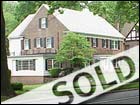
NEW YORK (CNN/Money) -
If you believe what you hear from economists these days, the hotly-debated real estate bubble is nothing more than urban myth.
But try telling that to the residents of Broward County, Fla., where housing prices have jumped 22 percent in the past year and 85 percent since 1993. You'll not get a sympathetic ear in the San Francisco Bay area, either, where $1 million buys you a measely 1,200 feet of space, a far cry from the 9,000-square-foot McMansions sprouting up in less inflated parts of the country at half the price.
Indeed, the average price of a single-family home rose 7.1 percent in April over a year ago, or nearly double the rate of inflation. Existing home sales, a key barometer of the housing market's health, hit records in four of the past five years, rising to 5.3 million last year from 4.2 million in 1997, according to the National Association of Realtors. This year, they're still smashing records and are on pace to hit 5.43 million in annual sales.
Looks like a duck, quacks like a duck ...
There's no technical definition of what constitutes a bubble, but economists point to the Internet stock phenomenon of the late 1990s as a good example. History buffs might recall another classic bubble -- the tulip mania in 17th Century Holland, when the price of a bulb skyrocketed to about 80 times the average annual salary at the time. Plot the prices on a chart and it looks like Mount Everest.
| |
 Also in this series ...
Also in this series ...
| |
| | |
| | |
|
"During the 1980s, the land at the emperor's palace in Tokyo was worth the value of all of the land in California," said Gerald Cohen, an economist at Merrill Lynch. "Now that's a bubble."
In the United States, there has never been a nationwide housing bubble. In fact, you need to look back more than 60 years, to the Great Depression, to find a case where the average national price of a single-family home declined year over year, said Frank Nothaft, chief economist at Freddie Mac.
Indeed, the housing market has shown remarkable strength in recent years, thanks to several factors. For one, mortgage rates are at 30-year lows, making home ownership more affordable to millions of people. The 30-year mortgage hit 6.76 percent for the week ending May 31. (Click here for more on the story.) Personal income levels also have been rising steadily, though unemployment is still historically low.
Investors have been turning to real estate en masse since the stock market slump began in 2000 -- seeking the relative safety of a stable asset. Many are using dollars once earmarked for equities to upgrade into a larger home or improve their existing properties, said David Kelly, economic advisor at Putnam Investments. Last year, the total national wealth in real estate hit $12 trillion, compared with $5.8 trillion in stocks. About 70 percent of Americans are homeowners.
The housing market is so mighty, in fact, that it snuffed out the economic recession months ahead of time. The reason is simple -- when you buy a house, you need a lawnmower, appliances and furniture. When you renovate, you need new windows and construction crews. Hence, consumer spending has remained robust in spite of the slowdown.
"People talk about the real estate bubble as a threat to the economy, but it's just the opposite," Kelly said. "The real estate market is one of the main reasons why consumer confidence is at the same level it was before the recession."
Don't brace for a plunge in prices
Nothing injects fear into the hearts of homeowners like the prospect of a plunge in prices. Some may recall getting stung when markets deflated in1990-1991. Perhaps they bought at the peak and got stuck for years with a high mortgage and couldn't refinance because the value of their house had fallen too far. Or maybe they were forced to sell at a loss because of a new job, or a divorce. Either way, it's tough medicine.
This time, though, economists say the post-boom is unlikely to play itself out so darkly. Inflation remains low and the economy is poised for a turnaround. There's no glut of inventory -- supply and demand are in balance.
They add, too, that homeowners need not worry about a collapse in prices. At worst, prices nationally will simply flatten out as the market cools off.
"Bubbles to me have a huge psychological component -- this mania that you're going to miss out if you don't buy," said Greg Jones, an economist with Briefing.com. "You can't make that case in the real estate market."
| |
 Related stories:
Related stories:
| |
| | |
| | |
|
It's worth noting, though, that there are signs things are starting to cool off. For example, the average home increased in value by 7 percent in 2001, according to Nothaft. This year, the average increase is likely to be 4 to 5 percent. Fannie Mae expects housing prices to increase by that amount annually over the next decade.
Anthony Chan, chief economist at Banc One Investment Advisors, cautions against buying real estate as an investment at this stage of the game. But he thinks homes will continue to appreciate over the long term. That means it's still the best hedge against inflation -- and the best way for the little guy to watch his money grow.

|

